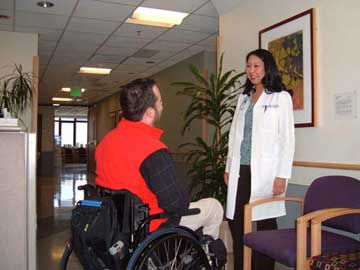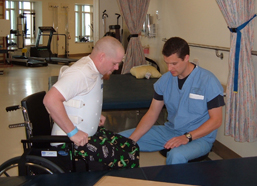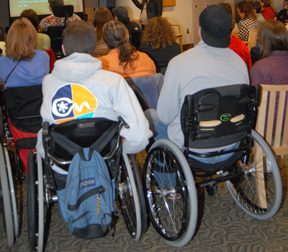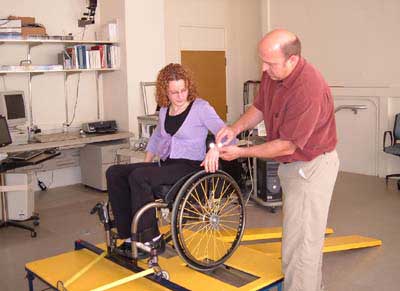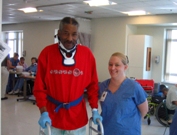SCI Forum Reports
Access to Public Transit
January 2, 1996
Seattle has been a leader in accessible public transportation since it first put lifts on buses in 1978, said Bob Carroll of Metro's Accessible Services Section. In fact, the lift used by most bus systems around the country was designed by a Metro engineer in 1977, because "when Metro was going to put them in, they couldn't find what they wanted, so they designed it."
The lift consists of a solid steel platform that stows under the bus and slides out when the driver activates a switch. "In about a year and a half, every single bus on every route will be equipped with a lift," Carroll said, adding that new lifts will have a 12-inch safety barrier on the sides to eliminate the possibility of falls. "Unless you're really trying, you can't get over those."
The lifts need about four feet of space in front of the bus entrance in order to deploy, so some bus stops with narrow sidewalks are not accessible, Carroll said. At present, every bus on an all-day route is accessible, and about half of those on commuter routes. If someone needs access to a route that is not accessible, "people can call, and we'll try to fill that need."
Transit agencies throughout the Puget Sound area offer a combined Regional Reduced Fare Permit for seniors and persons with disabilities. The permit costs $3 and entitles its bearer to substantial fare reductions on all public transportation in participating areas, including ferries. In King County, permit holders can ride anywhere, at any time of day, for 25¢. "If you travel frequently, you can get a monthly permit for $3.75 that allows you to travel as many times as you want without paying the quarter," Carroll said.
In King County, Metro's Paratransit OPTIONS Program provides two additional transportation alternatives, Taxi Scrip and Access Transportation Van Service, to Regional Reduced Fare Permit holders with low incomes. Taxi Scrip provides a 50% savings on taxi fares, and the van service provides curb-to-curb transportation on weekdays for the same fare as a bus ride. Van service rides must be arranged in advance (24 hours to seven days), and are given on a first-come, first-served basis.
Metro is also offering a third option, the ADA Paratransit Program, which provides van service seven days a week and has no low-income requirement. This new program allows passengers with disabilities to bring a companion in the van for most trips, and if the companion is an attendant who is needed to help the passenger travel, he or she rides for free. "You can register for all three programs, assuming you're eligible for all of them, and then pick the one that's most appropriate for the trip you're going to make," Carroll said.
"In general, this is probably one of the easiest places to get around, except for the weather and the hills."
For more information about accessibility on public transit in the Puget Sound area, contact one of the following agencies:
- Community Transit (Snohomish County)
(206) 348-2350 or 1-800-562-1375 - Everett Transit (Everett)
(206) 259-8801 - Intercity Transit (Lacey, Olympia, Tumwater, Thurston County)
(206) 786-1881 or 1-800-244-6846 - Jefferson Transit (Port Townsend, Sequim, Poulsbo, Jefferson County)
(206) 385-4777 or 1-800-773-7788 - Kitsap Transit (Bremerton, Kitsap County)
(206) 373-BUSS or 1-800-422-BUSS - Metro Transit (Seattle, King County)
(206) 553-3000 or 1-800-542-7876 - Pierce Transit (Tacoma, Pierce County)
(206) 581-8000 or 1-800-562-8109 - Washington State Ferries
(206) 464-6400 or 1-800-84-FERRY.

